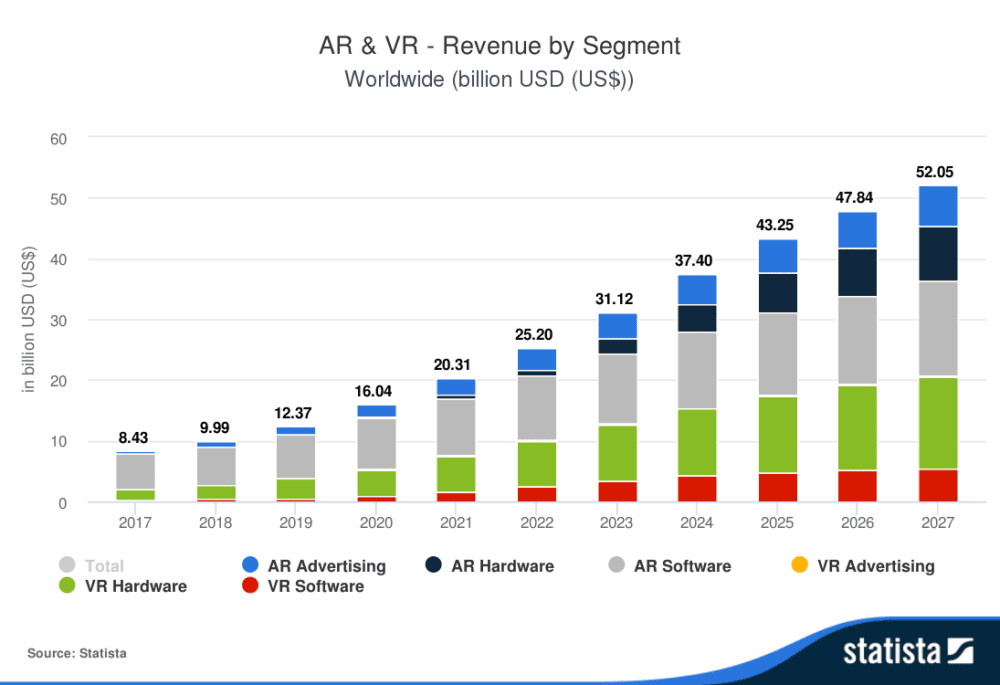Metaverse is the latest buzzword in the technology industry and hot on everyone’s lips. What’s it all about exactly? Is it a new virtual world, a new reality that is changing the way we live and work, or just a fad that will soon disappear? In this article, we take a closer look at this new technology, its potential applications and its impact on the future.
What is the metaverse?
On October 28, 2021, Facebook renamed itself Meta, reflecting the company’s long-term vision to create a shared virtual space that connects people from around the world. But Facebook, as a social media giant, has been doing that for a long time, right? True, but let’s try to dig a little deeper than that.
Imagine being part of a virtual world that looks and feels like the real world. You could explore cities, visit stores, and interact with others whenever you wish. You would be able to attend concerts, watch movies, or play any games you desire. You could even set up your own virtual house, decorate it, and invite friends over. Or you could attend virtual work meetings and conferences without leaving your house. For simplicity, you can think of a metaverse as the next generation of the internet.
Which technologies should be used?
For the metaverse to become a reality, it is important to understand that several new technologies must coexist: Among them, for example, virtual reality (VR), augmented reality (AR), head-mounted displays (HMDs), AR Cloud, Internet of Things (IoT), 5G, artificial intelligence (AI) to name but a few. Meta has already invested heavily in these technologies, developing hardware such as its Oculus VR headsets, while AR glasses and wristband technologies are also in the works. According to Statista, the market value of such virtual reality and extended reality sets is expected to grow from $31 billion in 2023 to $52 billion in 2027, a remarkable 13.7% compound annual growth rate.

Source: https://www.statista.com/outlook/amo/ar-vr/worldwide#revenue
However, there are other important innovations that can make metaverse a strategic technology trend:
1. Web3: Web3 is a new stack of technologies that enables the development of decentralized web applications. It gives users control over their own identity and data, a feature that is critical to the metaverse.
2. Spatial Computing: This is another important innovation that paves the way for the metaverse. This is a technology that seamlessly connects the physical and digital worlds. This technology allows users to interact with virtual environments in a more natural and intuitive way than has ever been possible before.
3. Digital Twin of a Person (DToP): This is another exciting new innovation that reflects a unique individual and represents a near real-time synchronized multi-presence. This technology enables individuals to be present in multiple places simultaneously, in both digital and physical spaces.
4. Digital Twin of a Customer (DToC): Similar to DToP, DToC is a dynamic virtual image of a customer that simulates behavior and learns to emulate and anticipate it. This technology enables the creation of highly personalized experiences in the metaverse, where customers can be individuals, personas, groups of people, or even machines.
Who will own the metaverse?
While Facebook’s recent rebranding as Meta and announcement of significant investment in building the metaverse has certainly brought this concept to the forefront, other tech giants such as Microsoft, Google, Nvidia, Qualcomm, and Amazon have also expressed interest in exploring the potential of the metaverse. In addition, smaller startups and gaming companies are also working to develop metaverse platforms. What we do know is that Meta, as an individual company, will not own the metaverse. What the ownership and management of the metaverse will look like in the future is a completely open book.
What opportunities does the metaverse offer for the automotive industry?
It’s easy to imagine the metaverse taking hold in the gaming and entertainment industries. What’s more exciting is, it also has the potential to go beyond these sectors and revolutionize the automotive industry.
One of the key areas where the metaverse could have a significant impact is in the development and testing of autonomous vehicles. The ability to create a virtual world where autonomous vehicles can be tested in a number of different scenarios would save a lot of time and resources compared to physical testing. The metaverse can also provide a virtual environment to speed up the prototyping process when developing a vehicle and use digital twins to optimize production processes. BMW’s virtual factory, for example, uses NVIDIA’s Omniverse software to create digital twins for each vehicle produced. Other OEMs, such as Hyundai, have also partnered with Unity, a game development platform, to build a meta-factory, which is a digital twin of the company’s physical factory supported by a metaverse platform.
In addition, the metaverse could be used to provide customers with a more immersive experience when purchasing a vehicle. According to a recent McKinsey and Co. survey, customers in the United States visited an average of only two showrooms before purchasing a vehicle, down from five in 2007. This trend could be leveraged to create a virtual showroom where customers can interact with different models and even customize their vehicles to their own specifications. This could revolutionize the car-buying experience, making it more appealing and personalized for consumers. Although a customer will always want to see the actual car in person before buying, this technology has the opportunity to reinvent car dealerships.
Revolutionizing the Automotive Industry and Transforming the Future
In summary, the metaverse will revolutionize the internet as we know it – including the automotive industry. Its impact will be felt in many ways, from development to manufacturing and distribution to customer services. Industry players who embrace the metaverse and use its capabilities to develop innovative products and services will undoubtedly have a competitive advantage over those who lag behind in its adaptation. The metaverse will create new revenue streams, transform the customer experience and enable new business models that were previously unimaginable. As we move toward a future where technology blurs the lines between the physical and digital worlds, the metaverse will play an increasingly central role in shaping the way we interact with each other. The question is not whether the metaverse will change the world, but rather how quickly and effectively industry players will adapt and embrace this new reality. The future is exciting, and the metaverse is undoubtedly one of the key drivers that will shape it.
Follow us on LinkedIn – Keeping you up to date on the status quo.



